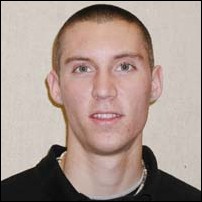Playing time diminishing for Champion

Image: Niner fans looking for dynasty; team just wants championship:Jimmy Spencer:
February 19, 2003
“He is ready to break out and do his thing,” said Hornet head coach Jerome Jenkins of center Tony Champion’s play in December. “Hopefully he can keep playing that way and we can build on that.”
Now, only a couple of months afterwards, Jenkins’ confidence in his junior center, who he once called his “Baby Shaq,” is diminishing. And so is Champion’s playing time.
“If (Champion) shows up, then he’ll play,” Jenkins said following a Jan. 23 loss to Idaho State, where Champion scored just two points and fouled four times in 12 minutes of play. “If he doesn’t, then he’ll have to sit right now. I’m really not happy with Tony Champion’s play right now.”
And that is just what Champion is doing — sitting.
Hood draped over his dispirited eyes, Champion wandered dejectedly out of the Hornets’ locker room following an 18-point loss to Northern Arizona. He logged only 10 minutes on the night and looked visibly frustrated on the court. He stood open in the post several times only to be overlooked by his teammates, or more significantly, by an offensive system unfavorable to his play.
It appears that coach Jenkins is neglecting his talented big man from Oakland, Calif.
At 6-foot-10, 295 lbs, Champion is the biggest center in the Big Sky (averaging at least 10 minutes a game).
For the Hornets, he is fifth in both scoring and rebounds, second in field-goal percentage and third in free throw percentage, but still ranks just seventh in minutes played per game.
If the Hornets’ offense made any attempt to throw the ball down to Champion in the post, they could exploit their center’s frequent mismatches.
By clearing out a side of the court and isolating the Champ along with a guard, the Hornets could utilize a two man game that would not only result in more points from the paint, but would open up an entire offense.
When defenses are forced to sag towards the basket or double-team, Champion could kick the ball back for open jumpers or hit slashing Hornets through the lane for easy baskets.
If the Hornets hope to realize greatness, they must make use of their big man and force other defenses to adapt. Not only will it help the offense, but also it will get opposing big men into foul trouble.
It appears for now, however, that Champion will have to wait his turn to lead the Hornet offense once again.
“I have to prove myself again in order to put myself back in that position,” Champion said.
Through all of this, the biggest guy on the team also remains the most pleasant. He doesn’t blame his teammates, he doesn’t blame his coaches — he only blames himself.
“I put myself in this situation I’m in,” Champion said, “and if I’m not doing my part, somebody else will step up.”
He explains his relationship with his head coach as a “love-hate” bond, just like any other player-coach relationship.
“Sometimes a little immaturity will come out and I will talk back a little bit,” Champion said. “I am out of line for doing that.”
This is an admirable guy we’re talking about. Coach Jenkins has driven him to the bench, spoken negatively about him through the press and ultimately taken back the keys to drive this team.
Yet he continues to stand by his coach and his team with the highest respect.And even though Champion may not be happy with his own play, it is apparent that he understands the ultimate goal of this team: To succeed.
“I feel that I’m not the only person on this team that can do damage,” Champion said. “We have a lot of weapons on this team. Everyone’s going to have their role.”
This past week the Hornets were victorious in both of their games. Still, each game told a different story for Champion.In Thursday’s game against Eastern Washington, Champion scored six points and played 21 minutes.But in Saturday’s game against Portland State, he participated in just three minutes of work and consequently scored just two points.
Champion’s role on this team may have changed, but when the Hornets are successful none of that seems to matter to Tony.
























































































































